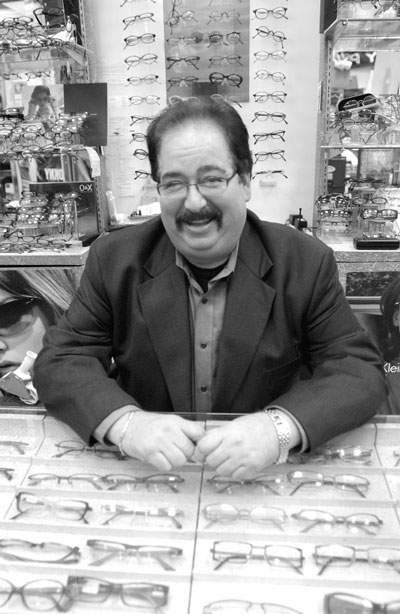By Jaclyn Marinese
Personal contact is the key to business for Leonard Altabet, owner of Worthy Eyes, an eyeglass store located on the corner of Church and Worth Streets in Tribeca. While he’s successfully run his enterprise for 25 years, recently things have been tough.
“It’s been an interesting two years,” says Altabet, “A little more interesting than I would have liked it to be.”
Staying in business after 9/11 has not been easy.
“Because of 9/11 I haven’t caught up for two and a half years,” said Altabet. “I’m working six days a week now because I don’t have the money to get enough help.”
Since 9/11, he has been forced to cut down from five employees to three, including himself.
After studying at optician’s school, Altabet, a Sheepshead Bay Brooklyn native, opened his first store in 1978 at 120 Worth Street. He had 600-square-feet and paid only $1200. He eventually expanded to the 2500-square-foot space he occupies today. But, the rent is high.
When added to other pressures, like the inability to access government-sponsored grant programs and the effects of managed care companies on the eyeglass industry, for Altabet, moving on after 9/11 has been a near-impossible task.
He hopes the bonds he’s established with the community will prove helpful during what is an extremely tough time for downtown businesses.
If the comments of a customer are any indication, those ties are strong.
“If I lived uptown I’d come here for glasses,” said Tony Nocito, a downtown resident who was at the store recently. He said he bought over $1000 worth of glasses for his entire family from Worthy Eyes in the last year. “He’s got great service. He cares about his customers and his prices are good, so you really can’t beat him. He knows his customers and he’s a nice guy.”
The personal bonds, however, are now being marginalized by what Altabet describes as the managed care takeover of the eyewear industry.
“Managed care is starting to ruin the industry due to the fact that they want to make the glasses,” said Altabet. He explained that managed care companies now arrange for the eye exam and manufacturing of the frames and lens, all roles that Worthy Eyes used to do. Now the eyeglass store’s only role is to dispense the glasses to customers for which it is reimbursed $15.
“How can you stay in business?” said Altabet.
The store still participates in many plans, but it is not the focus of the practice.
“I believe in making relationships as opposed to union contracts and hopefully people will realize it,” said Altabet.
The store has one other licensed optician, Donald Dunbar, and a licensed optometrist who is on-premises every Tuesday and Friday. It carries thousands of frames, disposable and extended-wear contact lenses, new prescription sunglasses, bifocals, sport, and reading glasses. Prices on frames range from $20 to $350 and lenses go from $45 up to $400 depending on the customer’s needs. Worthy Eyes carries contact lenses from companies like Freshhook, Acuvue and Surevue. Sunglasses range from companies like Geoffrey Beene to the sporty Marc Ecko collection and the store carries glass frames by almost every company imaginable like Oscar de la Renta, Pierre Cardin and Tommy Hilfiger.
After 9/11, Altabet joined “From the Ground Up,” a 600-member business advocacy group and the only downtown Manhattan organization that is set up for lobbying.
“Unfortunately I think the government and their various programs, both public and private, have systematically worn everyone down,” said Ariel Goodman, the group’s president. A Battery Park City resident for 10 years, Goodman was the owner of four small businesses that were on the 87th floor of World Trade Center.
“They [the programs] were all designed to fail from the get go. They really don’t care about us, but they pretend to.”
The programs she is referring to include the Small Firm Attraction and Retention Grant Program, which Goodman says is more focused on the “attraction” than the “retention” component. She notes that store owners like Altabet – who has been in the area for 25 years – can not qualify for the available monies unless they are able to renew their leases for 5 years. That presents a two-fold problem: small business like Worthy Eyes, that have been struggling since 9/11 are reluctant to commit to five years, because they don’t know if they can make a go of it. Second, landlords are not willing to renew leases, at least not at current rents, and the businesses cannot afford a rent increase, according to Goodman.
The money is also awarded according to the number of W-2 status employees the business employs. For businesses like Worthy Eyes, which only has three employees, retention money would be minimal, even if the landlord cooperated.
“There’s going to be a huge price to pay for not helping out the small guy who employs most of the people and pays most of the taxes,” says Goodman. Goodman said that the rate things are going, many downtown small businesses will not be able to hang on.
For Altabet, the struggle has been long, and he admits that he’s not exactly sure how he’s been able to stay above water over the last two years as many businesses around him are shutting their doors. With three years remaining on his lease, Altabet remains positive but says the future of the business depends on what the landlord wants to do.
“Somebody should have thought about us store owners, more than with just a retention program,” he said. “If we all went out of business on 9/12, how normal would downtown truly be? We used a lot of our own money to stay in business, in some cases everything we saved.”



































